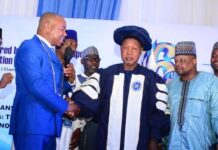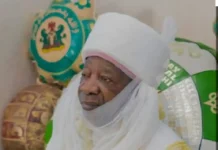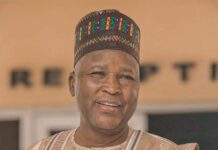Pantami’s Professional Chair Saga : It Is stigmatization – MURIC
POLITICS DIGEST – There has been uproar lately on the appointment of the Minister of Communication and Digital Economy, Professor Ali Isa Ibrahim Pantami, as a Professor of CyberSecurity by the Federal University of Technology (FUTO). However, the Muslim Rights Concern (MURIC) has described the imbroglio as sheer ethnic stigmatisation and religious profiling.
“MURIC’s contribution came on Monday, 27th September, 2021 in a press statement issued by its director and founder, Professor Ishaq Akintola.
MURIC said, “We are perturbed by the recent uproar over the appointment of the Minister of Communication and Digital Economy, Professor Ali Isa Ibrahim Pantami, as a Professor of CyberSecurity by the Federal University of Technology (FUTO). It is much ado about nothing and an exercise in perpetual idleness and irredeemable laziness.
“Pantami’s detractors are armchair critics and educated illiterates engaging in intellectual escapism. The answers to their quests are right there in their backyards but they did not bother to look. They are merchants of hate peddling misinformation. Pantami has not committed any crime or done any wrong in this matter. Many academics serving in government have had the priviledge of doing exactly what the honourable minister did.
“Unlike Pantami’s critics who rushed to make unsubstantiated allegations, MURIC took the pain to make enquiries far and wide. We spoke to university lecturers in various campuses and our findings show that academicians are allowed to apply for appointments and promotions while serving in public office so long as they have fresh publications.
“Professor Ngozi Osarenren of the Department of Educational Foundation, University of Lagos, got her professorial chair while serving as commissioner for education in Edo State. At the Lagos State University (LASU) the late Professor Abdul Rasheed Kunle Lawal became a professor while serving as commissioner in the Lagos State government. Also, Professor Musibau Babatunde of the University of Ibadan became a professor while serving as Special Adviser to the governor of Oyo State.
“In Bayero University, Kano (BUK), Professors Ibrahim Makari and Musa Usman got their chairs while serving in government. In Usman Dan Fodiye University (UDUS), a lecturer was promoted to the post of associate professor while on leave of absence around 1996. Another lecturer in the Faculty of Agriculture also got promoted while serving the Zamfara State government. A staff of the Faculty of Law who is still serving in government was promoted to the post of associate professor three years ago. Dr Abdullahi Balarabe got his doctorate degree while serving as Speaker in the Sokoto State House of Assembly.
“Dr. Muhammad Ali Pate was a serving Minister of Health in Nigeria when he was appointed Professor of Public Health Leadership at the Harvard T. H. Chan School of Public Health. That was in 2013. Where were the wailers at that time?
Was it not in this same Nigeria that Okereke Onyiuke of Stock Exchange was given the same professorial chair by a university from the same South East and nothing was heard in form of a protest? So why the hullabaloo when a Fulani Muslim bags a professorial chair?
Read Also:
“We also contacted FUTO. According to Professor Eze, the former Vice Chancellor of that university, FUTO followed due process in the exercise that led to the appointment of Professor Ali Isa Ibrahim Pantami to the post of Professor of Cybersecurity. ‘We advertised. He applied. We followed our rules and regulations. We did a prima facie in March 2021 and his papers were sent out. They came back positive. The Council in another meeting approved his appointment. It is his detractors that are creating this problem.’
“But the practice differs in the University of Ilorin and the University of Port Harcourt where a staff serving in public office is not eligible for promotion or appointment. We consider this as unfair because these two universities are denying lecturers serving in government the opportunity to use the publications which they laboured to acquire for promotion and appointment. This policy will also discourage lecturers in those two universities from taking up government appointments whenever they are offered. It is therefore counter-productive.
“It is possible in this kind of situation for their colleagues to leave them behind. Serving in government is tantamount to serving the nation. Those who are offering such services and who still create time to write and publish academic papers in reputable journals both locally and internationally should not be denied the opportunity of getting promoted to the next positions.
“From the above, it is clear that with the exception of two universities, the common practice is that academicians serving in government often respond to advertisements in their places of primary assignment or in other universities. They may also submit their curriculum vitae for promotion during the annual assessment exercise if they are ripe for promotion. It is the duty of the university to allow them to compete with staff on ground in such exercises.
“That is why groups like the Academic Staff Union of Nigerian Universities (ASUU) need to steer clear of the Pantami debate. ASUU has no business whatsoever conducting investigations into the matter. Its integrity may get eroded if care is not taken because the debate is looking more of ethnic stigmatisation and religious stereotyping. ASUU may get its fingers burnt in this.
“Pantami’s critics failed woefully in their attempt to rubbish his great strides. Many of them still find it hard to believe that a Northerner, an Hausa man, a Fulani or a Muslim for that matter, cannot be this brilliant. They are therefore determined to bring him down. It is sheer ethnic stigmatisation and religious profiling.
“MURIC advises Pantami’s detractors to desist from armchair criticism. They should do proper investigations and inject some modicum of objectivity into their views when criticising. For example, they would have known better if they had contacted university lecturers in one or two Nigerian universities. But they left undone what they should have done. Conducting proper investigations would have empowered them to speak from an uninformed position.
“We find it hard to see what crime the honourable minister has committed. Pantami’s detractors can have a point if they can provide evidence of his earning double salary. But do they have that? We are waiting for such evidence. Until then, we give Pantami a clean bill of health.”
Professor Ishaq Akintola,
Director,
Muslim Rights Concern (MURIC)

















